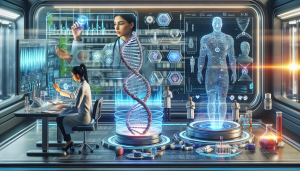 UseCasesFor.ai
UseCasesFor.ai
Choose Topic
 UseCasesFor.ai
UseCasesFor.ai
AI Use Cases
A collection of over 250 uses for artificial intelligence
A continually updated list exploring how different types of AI are used across various industries and AI disciplines,including generative AI use cases, banking AI use cases, AI use cases in healthcare, AI use cases in government, AI use cases in insurance, and more

Sign up
to receive a PDF containing all the use cases and stay updated with the latest AI trends and news (you can always unsubscribe)
Genetic marker identification and consideration

Introduction
There is one of the most advanced fields of healthcare which has been greatly influenced by the integration of the machine learning and artificial intelligence and it is the detection and assessment of the genetic markers. Genetic markers are defined as DNA segments that have a defined chromosomal address and can be applied to determine the link between a genetic disease and its genetic foundation. This is usually a variation or a mutation of a single DNA base. Since the genetic data are increasing at an accelerated rate, artificial intelligence and machine learning have emerged as vital tools for discovering and interpreting these genetic markers which may lead to precise medicine and diagnosis of diseases at early stages.
Challenges
There are certain issues that one can encounter when applying AI in genetic marker identification as well. First, the large and complex data sets are demanding on resources and algorithms that are sophisticated. Second, genetic data is sensitive meaning that privacy and security is a concern. Third, there is no consensus on the data collection and analysis techniques used in different studies which makes it hard to compare or integrate the data. Fourth, the understanding of the genetic results is highly advanced and this is not an easy process. Fifth, there are still issues with the application of AI in this area since it is a relatively new and dynamically developing field. Sixth and last, there are ethical issues that come with genetic testing and the results.
AI Solutions
Despite all of these challenges, AI has been demonstrated to be very effective in the detection and interpretation of genes and their markers. Such big data can be analyzed by machine learning algorithms and patterns which are not easily observable by a human being can be identified from it. For example, DeepVariant is an AI tool developed by Google’s AI subsidiary DeepMind which uses deep learning to create very accurate images of a person’s genome from his or her high-throughput sequencing data. In addition, it is capable of assisting in the understanding of the genetic information, the prediction of gene functions and the consequences of mutations. It can also contribute to the creation of individualized treatment regimens taking into consideration the patient’s genetic background. Also, it can improve various aspects of security when dealing with genetic information.
Benefits
The benefits of using AI in genetic marker identification are multifaceted. AI can significantly speed up the process of analyzing genetic data, saving time and resources. It can also increase the accuracy of genetic analysis, reducing the risk of errors and misdiagnosis. AI can facilitate the early detection of diseases, improving patient outcomes. Moreover, AI can enable personalized medicine, tailoring treatment plans to an individual's genetic profile. Lastly, AI can contribute to scientific research, helping to uncover the genetic basis of diseases and develop new treatments.
Return on Investment
The ROI of applying AI in the identification of genetic markers can be very high. It has to be noted that although investment in AI is costly at the beginning, the returns are sustainable. AI can also help in the process of genetic testing thereby reducing the time and costs involved. It can also contribute to better diagnosis and better treatments thus decreasing the healthcare costs in the future. In addition, AI is capable of providing important information that can facilitate advancement of knowledge and creation of new products and services, which may create value in the pharmaceuticals and biotech industries. According to Accenture, application of AI in healthcare may create a financial impact of $150 billion for the US healthcare economy by 2026.